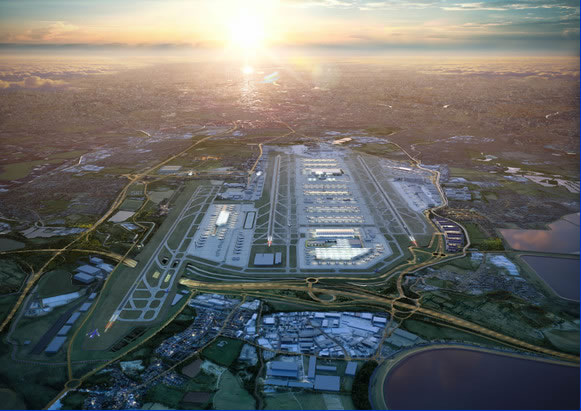Report Suggests Heathrow Expansion Will Hit Regions
Claim made that third runway does not fit with Government’s 'levelling-up' agenda

A report by the New Economic Foundation (NEF) is claiming that the expansion of Heathrow will have a massively negative affect on the regional economies of the UK.
They estimate that the cost to the country outside of London and the South East in terms of lost economic growth will be as much as £43 billion and point out that this contradicts the government's stated aim of ‘levelling-up’ the rest of the country.
The NEF say that an expanded Heathrow will result in 27,000 jobs relocating to the surrounding area and that they have based this conclusion on government data which they obtained through FoI requests.
The North West and the West Midlands will be worst affected losing 15,000 and 5,000 jobs respectively.
The impact of expansion would also effectively transfer £3.3bn worth of emissions out of other regions and nations of the UK and into London between 2030 and 2050. This would place an even greater burden on the economies and people of the regions to decarbonise at an even faster rate than currently planned.
Building the third runway means that 17 million fewer passengers would depart from non-London Airports according to the report.
Dr Alex Chapman, researcher at the NEF, said, “When the decision to approve Heathrow expansion went in front of parliament, MPs were given virtually no information on the distribution of costs and benefits across the UK’s wider regions. Our three Freedom of Information requests show that the Department for Transport could, and should, have given a far more detailed picture.
“We already know that expanding Heathrow throws fuel on the fires of the climate emergency. This new data shows it is also likely to drive regional inequality in the UK economy. Heathrow expansion moves jobs and productivity to London and the south-east and, in a carbon capped world, it also threatens our ability to deliver a just transition for workers. With the majority of workers in other carbon intensive sectors based outside London and the south-east, this represents a double blow to the regions.”
The official government evaluation of the scheme did not analyse the impact on the regions in details and many MPs from outside the south east voting in favour which Dr Chapman attributes to a ‘slick lobbying operation’.
Paul McGuinness, Chair of the No 3rd Runway Coalition, said of the figures in the report, “They clearly demonstrate that Government has known that what little economic benefit is created by expansion will only benefit London and the South East. The fact that half the jobs lost not directly associated with the aviation sector which indicates the wider negative impacts on regional economies.
“It’s now vital for Government comes clean to Parliament about the economic damage caused by expansion. They should withdraw the Airports National Policy Statement and reassess their airport capacity strategy for the whole country.”
A Heathrow spokesperson said, “The reason for overwhelming support from nationwide business chambers and regional airports for Heathrow expansion is because our proposals will deliver for every corner of this country while meeting the most stringent environmental targets. Only by expanding Heathrow can the Government deliver its promise of levelling up the country through economic prosperity, whilst fulfilling the Prime Minister’s vision of a Global Britain. Heathrow is the biggest port handling 40% of this country’s exports and connects every region in the country to global markets. As long as Heathrow remains constrained and this debate continues, the UK will continue to hand global connectivity and trade to our European competitors.”
February 25, 2020